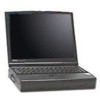Dell Latitude Xpi CD MMX Installing Drivers - Page 5
Windows 3.x, Installing the Audio Drivers, Windows 3.x or Windows for Workgroups 3.x, or Windows - technology
 |
View all Dell Latitude Xpi CD MMX manuals
Add to My Manuals
Save this manual to your list of manuals |
Page 5 highlights
To access the built-in PC Card utility in the Windows 95 operating system, click the Start button, point to Settings, and then click Control Panel. Then double-click the PC Card (PCMCIA) icon, and follow the instructions on your screen. If you need more information, see your Windows 95 documentation. NOTES: The driver for the PCI 1131 CardBus controller on the Dell Latitude XPi CD M166ST is compatible with the PCI 1130 controller on the Dell Latitude XPi CD P150ST. However, the driver for the PCI 1130 controller is not compatible with the driver for the PCI 1131 controller. Do not use the PCMSetup for Windows icon in the PhoenixCard Manager program group or folder. Use the CardAgent icon if you need to configure your PC Card settings. Windows 3.x To install the PC Card Manager utility in the Windows 3.x operating system, follow these steps: 1. Save your work and close all application programs, because you will need to restart your computer at the end of this procedure to complete the installation. 2. Remove any PC Cards from your computer. 3. Check your config.sys file to make sure the line containing the filename emm386.exe reads as follows: device=C:\dos\emm386.exe noems If you need more information about how to edit your config.sys file, see your MS-DOS documentation. 4. Insert Card Manager Diskette 1 into the diskette drive. 5. In the Program Manager, select the Run option from the File menu. 6. Type a:\install in the Run window. Then click the OK button or press to install the utility on your hard-disk drive. 7. Follow the instructions on your screen, and insert Card Manager Diskette 2 when prompted. 8. After the PC Card Manager utility is installed, Dell recommends that you check your config.sys file to make sure the line containing the filename emm386.exe reads as follows: device=C:\dos\emm386.exe noems X=d000dbff 9. Restart your computer to use the utility. If you do not plan to use a removable storage card (such as an Advanced Technology Attachment [ATA] card), follow these steps: 1. Locate the line that reads as follows: devicehigh=C:\pcm401\program\ pcmata.sys 2. Add the rem command to the beginning of that line. After you add the rem command, the line should read as follows: rem devicehigh=C:\pcm401\program\ pcmata.sys If you need more information about how to edit your config.sys file, see your MS-DOS documentation. Installing the Audio Drivers Dell provides audio drivers so you can customize the sound features of your computer. NOTE: The driver for the ESS 1887 controller on the Dell Latitude XPi CD M166ST is compatible with the ESS 1888 controller on the Dell Latitude XPi CD P150ST. However, the driver for the ESS 1888 controller is not compatible with the driver for the ESS 1887 controller. Windows 3.x or Windows for Workgroups 3.x To install the audio drivers in the Windows 3.x or Windows for Workgroups 3.x operating system, follow these steps: 1. Save your work in all open application programs, because you will need to restart your computer at the end of this procedure to complete the installation. Installing Utilities and Drivers 5









